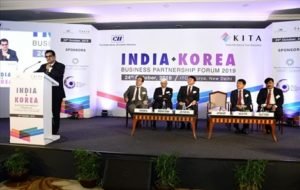FDI: 98% through automatic route, says Kant
Many measures being taken by the Indian Government to attract Korean investment into the country, according to Amitabh Kant, CEO, NITI Aayog.
India was just beginning on its journey of urbanization which offered many opportunities for Korean companies to collaborate in India, said Kant.
The 100 smart cities, 50 new metros as well as other infrastructure projects such as airports and upgradation of railway stations offer opportunities to the Koreans.
These projects offered opportunities for Korean companies to expand their footprint in India, he pointed out.
Other areas for cooperation included IT & Electronics and the services sector especially tourism.
There was enormous scope for Korea to rise from the 14th largest investor in India to the top five, he believes.
Kant was speaking at the India–Korea Business Summit being organized by the Confederation of Indian Industry (CII) and the Korea International Trade Association (KITA) in New Delhi on 24 Oct 2019.
He highlighted that India jumped 14 ranks from 77 to 63 in the World Bank’s Ease of Doing Business indicators of the World Bank. This was the result of the Government’s drive to improve business environment in the country.
He pointed out that over the years the Government has been liberalizing its FDI regime and today around 98% of FDI can come in through the automatic approval route.
A dedicated Korea Plus desk had also been set up to facilitate Korean Investment in India, he added.
India–Korea collaboration has a strong base, added Joo Hyung-Chul, Advisor to the President of South Korea for Economic Affairs and Chairman of the Presidential Commission on New Southern Policy.
More than 500 Korean companies are currently operating in India and Indian companies like the Tatas and the Mahindras have laid down roots in Korea.
Joo was of the view that the New Southern Policy of Korea and India’s Act East Policy complement each other and form a strong basis for the partnership.
There is a huge potential to improve bilateral trade and investment between the two countries, elaborated the Korean Ambassador Shin Bong Kil.
Bilateral trade of around US$25 billion was well on its way to meet the US$50 billion target set by the two governments for the year 2030, added the envoy.
Cooperation between SMEs and startups held the key to future collaboration between the two countries, believes Shin.
Sanjay Chadha, Additional Secretary, Department of Commerce, sees a review of the India–Korea Comprehensive Economic Partnership Agreement (IKCEPA) to further promote bilateral trade between India and Korea.
India has tremendous potential in increasing its market share in Korea in terms of goods such as drugs and pharmaceutials and services such as IT and Medical Services, he pointed out.
The two countries could work together in sectors such as conventional and renewable energy, leather and leather products and tourism, added Shreekant Somany, Chairman, CII MSME Council, Past Chairman CII-Northern Region & Chairman and Managing Director, Somany Ceramics Limited. Fiinews.com










